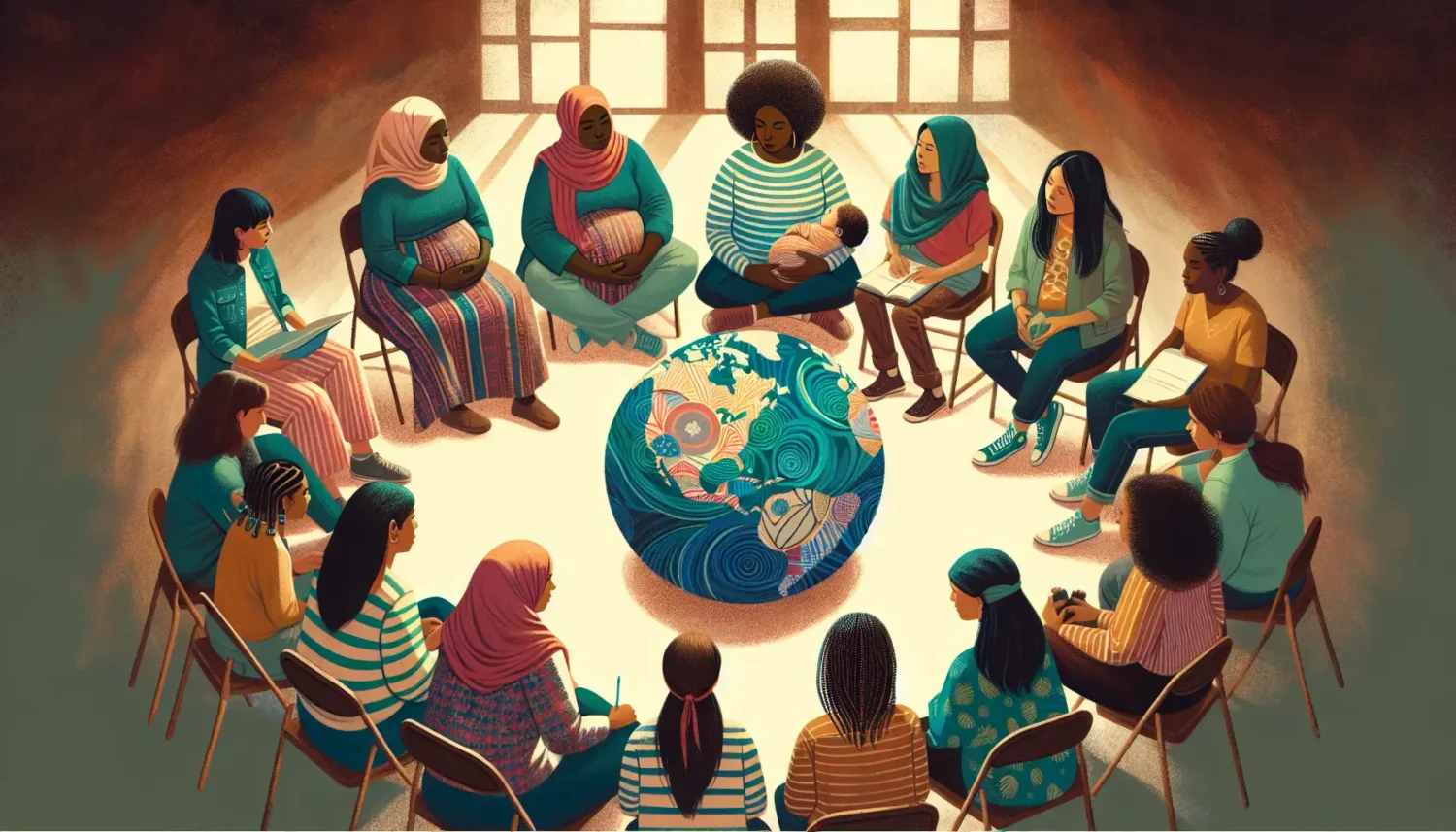In the United States, Black women encounter a maternal mortality rate alarmingly higher than that of White women. This stark disparity casts a light on systemic failures in Black maternal health. This article is to educate on the importance of black maternal and infant health with the goal of changing maternal mortality.
Quick Overview
- Black women in the U.S. face a disproportionately higher rate of maternal mortality, influenced by systemic racism and preventable pregnancy-related complications, highlighting a need for urgent interventions.
- Enhanced comprehensive care throughout the maternal health continuum, including preconception, prenatal, and postpartum services, and overcoming barriers to healthcare access are essential at CarePlus New Jersey for improving Black maternal health outcomes.
- Strengthening community support, advocating for policy change, and leveraging technology and innovation are key strategies in addressing the racial disparities in maternal healthcare and supporting the mental well-being of Black mothers.
- The Maternal & Family Center at CarePlus offers comprehensive services for prenatal, pregnant, and postpartum women, as well as families. These services include individual, family, and couples therapy; medication management and monitoring; support groups; case management through psychoeducational counseling; peer support; family support for spouses, partners, and fathers; care coordination with PCP/OB-GYN and other outside providers; and specialized referrals to other supportive services. The center ensures holistic care and support for women and families during these critical stages.

The Urgency of Addressing Black Maternal Health
In learning about maternal health, one cannot ignore the pressing reality that Black women in the United States face a maternal mortality rate three to four times higher than their White counterparts. This alarming statistic is not just a number; it represents mothers, daughters, and sisters whose lives are cut short by a system that fails to protect them, leading to an increased risk of maternal death.
The roots of this crisis run deep, with systemic racism infiltrating every aspect of healthcare for Black women. The impact of these disparities is profound, as over 80% of pregnancy-related deaths are preventable with the right interventions and awareness of urgent maternal warning signs. This is more than a health issue; it’s a moral imperative to address the health outcomes for Black mothers that are undeniably influenced by the scourge of systemic racism and pregnancy related complications.
“Maternal mental health conditions are the number one cause of death in pregnant and postpartum women in the United States,” said Melissa Oparaku, Vice President of Outpatient Services at CarePlus NJ. “But for Black women, the maternal mortality rate is over four times higher than the rate for white women. Our goal is to unite maternal health experts from multiple disciplines to raise awareness and challenge implicit biases in laws, policies, institutions, and providers. In addressing these biases we can improve access to necessary care, provide more adequate treatment and greatly reduce the unnecessary loss of black mothers and babies.”
Comprehensive Care for Black Mothers During the Reproductive Years
Moving through the maternal health continuum, it becomes evident that comprehensive care is a cornerstone in safeguarding the well-being of Black mothers. Such care extends beyond routine check-ups and embraces the full spectrum of maternal and child health needs from preconception to postpartum. Interdisciplinary care teams, which may include community health workers and doulas, play a pivotal role in personalizing care and addressing external barriers such as transportation and housing.
CarePlus New Jersey’s Maternal and Family Center stands as a beacon of comprehensive mental health care, offering care that cater to women before, during, and after pregnancy and involving families in the maternal care process.
Preconception and Prenatal Care: Building a Foundation for Healthy Pregnancies
The journey to motherhood ideally begins before conception, where preconception care lays the groundwork for a healthy pregnancy, mitigating risks of complications and ensuring the health of both mother and baby. Access to such services, including preventive care through Medicaid, is linked to more favorable birth outcomes and underscores the necessity of early and consistent care.
The cultural appropriateness of prenatal care is further enhanced by the involvement of midwives and nurse practitioners who bring invaluable insight and support to diverse communities.
The Postpartum Period: Supporting Mothers After Birth
The postpartum period, often referred to as the ‘fourth trimester’, demands just as much attention and care as the preceding nine months. Initiatives like doula coverage and home visiting programs are instrumental in bolstering postpartum support for new mothers. Emotional and practical support, especially for those grappling with challenges or loss, is provided by organizations through support groups, while innovative text-message-based systems like Heart Safe Motherhood and THEA keep a vigilant eye on postpartum health indicators such as blood pressure.
Navigating Barriers to Quality Maternal Health Care
Despite the known benefits of comprehensive care, Black women often encounter formidable barriers when attempting to access quality healthcare. The disparities manifest in higher rates of being uninsured, financial constraints, and the chilling effects of systemic racism. Medicaid stands out as a critical equalizer, offering a lifeline for prenatal care and childbirth for Black and Latina women. However, the path to equitable care also requires culturally competent care and a diverse healthcare workforce that can effectively combat implicit bias and systemic issues.
Programs like CarePlus New Jersey’s Maternal and Family Center expanded services helps dismantle these barriers and improve access to maternal and infant health services.

Mental Health Matters in Maternal Care
Turning our focus to the often-overlooked aspect of maternal health, mental well-being is paramount. To address maternal mental health, it’s crucial to consider that Black mothers report maternal mental health conditions at a rate close to 40%, a stark contrast to the experiences of their counterparts. Factors such as increased trauma exposure and childbirth complications heighten the risk for maternal mental health disorders.
The economic toll of untreated mental health disorders is staggering, with an estimated cost of $14.2 billion over five years, highlighting the urgent need for effective diagnosis and treatment. Yet, the treatment gap is alarming, as Black women are twice as likely to suffer from mental health conditions but only half as likely to receive treatment compared to white women.
The Maternal & Family Center at CarePlus New Jersey
The Maternal & Family Center at CarePlus offers support and care for women and families during some of the most crucial times in their lives. The center is dedicated to providing a comprehensive array of services designed to meet the diverse and intricate needs of prenatal women, pregnant women, postpartum women, and families.
LaDeana Artis, senior director of outpatient services with CarePlus, said a complicated combination of causes — including structural racism and implicit bias — leads to higher rates of illness and lower rates of treatment for Black women.
Mental Health Care for Prenatal, Pregnant, and Postpartum Women
The Maternal & Family Center at CarePlus aims to help women improve their ability to cope and function in their daily lives and enable women and families to develop skills to promote mental health wellness. Maternal mental health disorders, also known as perinatal mood and anxiety disorders (PMADs), can manifest in a variety of the following ways:
- Overwhelming exhaustion and fatigue
- Withdrawal from family and friends
- Deep sadness or hopelessness
- Not feeling like yourself
- Lack of joy in life
- Feelings of shame, guilt, or inadequacy
- Difficulty bonding with the baby
- Intense irritability or anger
- Severe mood swings
- Excessive worrying
The Maternal and Family Center program is equipped to address conditions such as depression, anxiety, other mood disorders, substance use disorders, trauma, OCD, psychosis, and other mental health conditions. The program’s team of experts offer individual, family, and couples counseling along with support groups to help every step of the way. This includes family support as well as education for dads, spouses, partners, and loved ones. The program coordinates with primary care doctors, OB/GYNs, or outside mental health professionals. Individualized case management support through psychoeducational counseling is also available. Perinatal psychiatrists and advanced practice nurses are available to provide medication evaluation, management, and counseling. These programs help expectant mothers understand the physical and emotional changes they will experience and provide them with the tools to manage these changes effectively. Whether you are planning to become pregnant, currently pregnant or postpartum, or have experienced the loss of a pregnancy or child, you will find a nurturing environment at the Maternal & Family Center where you can receive the care and support you need no matter the stage of life you are in.
Involving families
The center also recognizes the importance of involving families in the care process. Family-centered programs are designed to support not just the mother and baby but also partners and other family members. These programs focus on family dynamics, parenting skills, and emotional support, ensuring that the entire family unit is prepared to welcome and nurture the new baby.
Overall, the Maternal & Family Center at CarePlus stands out as a comprehensive provider of essential services that cater to the complex and varied needs of women and families during the prenatal, pregnancy, and postpartum stages.
Understanding Perinatal Mood and Anxiety Disorders (PMADs)
Perinatal Mood and Anxiety Disorders also known as “PMADs” can deeply affect Black women during their pregnancy and for quite some time after their pregnancy. The unique manifestations of PMADs in this population, compounded by systemic and interpersonal racism, require careful and empathetic understanding for effective diagnosis.
Symptoms can range from overwhelming exhaustion to severe mood swings, and the acknowledgment of these signs is critical for timely intervention.
Breaking the Stigma Around Maternal Mental Health
To further compound the challenge, the stigma surrounding maternal mental health often silences those in need. Over half of the postpartum depression cases in women of color go unreported, hinting at a systemic issue of awareness and accessibility in health care. The societal pressures embodied by the ‘strong Black woman’ stereotype, along with concerns about child welfare involvement and financial constraints, deter Black mothers from seeking the support they desperately need.

Championing Community Support and Advocacy
In the face of systemic challenges, community support and advocacy emerge and offer hope, vital for the improvement of maternal health outcomes for Black women. Organizations like MomsRising and the Black Maternal Health Caucus stand on the frontlines, advocating for cultural, legislative, and policy changes that can shift the tide during Black Maternal Health Week and beyond.
The collaborative efforts of community-based organizations with healthcare providers and stakeholders are instrumental in crafting inclusive maternal health initiatives that address the needs and voices of Black mothers.
The Power of Support Groups
Support groups wield a profound influence on the postpartum experience, offering solace and solidarity to new parents and those who have faced the heartbreak of loss.
The Maternal & Family Center at CarePlus is dedicated to supporting families throughout the many stages of parenthood. The support groups offered can provide a safe space for parents to ask questions, share their own stories, and receive support from others who have encountered similar emotions and experiences. The program provides a spectrum of support groups that cater to the multifaceted needs of prenatal, pregnant, and postpartum women and families. These include but are not limited to:
- Moms Helping Moms: A supportive environment for new moms to connect and share experiences
- Madres Ayudando Madres (Spanish Speaking Version of above)
- Resiliency: A Trauma-Informed Perinatal Support Group
- The Maternal & Family Center support groups can help you connect with other parents, talk about your experiences, and learn helpful tools and recourses as you navigate your journey into new parenthood.
- Whether you are experiencing stress, adjustment to parenting, baby blues, pregnancy, or postpartum depression or anxiety, support groups are here for you. Babies and children are welcome and encouraged to attend with their parents!
Mobilizing for Change: The Role of Advocacy
Advocacy transcends individual support to influence broader policy and public awareness, a crucial element in the fight for improved maternal and infant health outcomes. The Black Maternal Health Federal Policy Collective and similar organizations play a strategic role in ensuring that federal policies reflect the needs of Black mothers.
These concerted efforts aim to raise awareness and promote policy changes that are fundamental to the health of mothers and their babies.

Leveraging Technology and Innovation in Maternal Health Care
The advent of technology and innovation presents a new frontier in maternal health care, with telehealth services and mobile applications poised to broaden access and enhance the quality of care for Black mothers.
Data stratification tools that consider racial and ethnic disparities, as well as socioeconomic factors, which are social determinants of health, enable health systems to tailor interventions and improve maternal health outcomes, as evidenced by initiatives like the teal bracelet and aspirin usage programs.
A Call to Action: How Health Care Providers Can Reduce Disparities
To reduce racial disparities in maternal health falls squarely on the shoulders of healthcare providers. To achieve equitable care, providers must:
- Address unconscious bias
- Actively listen to patients
- Standardize care coordination
- Prioritize education on urgent maternal warning signs
- Ensure effective management of chronic conditions to support maternal health.
Moreover, the training of non-obstetric care providers to enquire about pregnancy history is vital in optimizing maternal health outcomes.
Summary
It’s clear that the path to improved Black maternal health is multifaceted, requiring a collaborative effort from healthcare providers, policymakers, community advocates, and technology innovators. The layers of systemic racism, socioeconomic barriers, and the stigma surrounding mental health must be peeled back to reveal a system that supports and empowers Black mothers.
The Maternal & Family Center at CarePlus offers service to women in all stages of motherhood and family planning.
Together, we can create a future where maternal health disparities are a thing of the past, and every mother has the opportunity to experience the joys of motherhood without undue risk.
Frequently Asked Questions
The virtual panel discussion hosted by CarePlus NJ’s Maternal & Family Center addressed perinatal mental health for Black women and families before, during, and after pregnancy. It aimed to provide valuable insights into this important topic.
Black mothers are less likely to receive treatment for maternal mental health issues due to factors such as fear of stigma, involvement of child welfare services, and financial barriers. It’s important to address these obstacles to ensure all mothers receive the support they need.
Healthcare providers can reduce disparities in Black maternal health by addressing unconscious bias, actively listening to patients, standardizing care coordination, educating on urgent maternal warning signs, and managing chronic conditions effectively. By implementing these strategies, healthcare providers can work towards reducing disparities in Black maternal health.
By providing telehealth services, mobile health applications, and continuous monitoring devices, technology and innovation can enhance access and quality of care for Black mothers. This can significantly improve maternal health care.
Community support and advocacy are important for raising public awareness, influencing policy changes, and designing inclusive health initiatives to address disparities in maternal health care for Black women. This helps in improving Black maternal health.
Sources:
https://www.njspotlightnews.org/video/addressing-mental-health-needs-of-black-mothers
https://paramuspost.com/article.php/20240418160916653
https://www.cdc.gov/healthequity/features/maternal-mortality/index.html
https://nationalpartnership.org/report/black-womens-maternal-health
https://www.cdc.gov/nchs/data/hestat/maternal-mortality/2021/maternal-mortality-rates-2021.htm

CarePlus NJ, INC. is dedicated to excellence in mental healthcare and has a commitment to life-long support needed by individuals and their families to ensure that they achieve their full potential and improve the quality of their lives.

